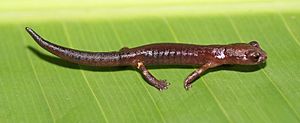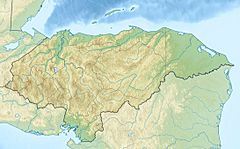Cataguana salamander facts for kids
Quick facts for kids Cataguana salamander |
|
|---|---|
 |
|
| Conservation status | |
| Scientific classification |
The Bolitoglossa cataguana, also known as the Cataguana salamander, is a special type of salamander. It belongs to a family called Plethodontidae. This salamander is found only in Honduras, a country in Central America. It was first discovered near a place called Cataguana, in the Marale area of the Francisco Morazán Department.
What Does It Look Like?
The Cataguana salamander is a small creature. Scientists studied several of these salamanders to describe the species. The first adult female found was about 45 millimeters long from its snout (nose) to its vent (a body opening). Other adult females were between 35 and 50 millimeters long. An adult male was about 40 millimeters long.
These salamanders have 13 grooves on their sides, which are called costal grooves. Their toes have special pads that help them grip surfaces, and the tips of their toes are rounded. The tail of the first female found was 32 millimeters long. It looks a bit squeezed at the base, then gets a bit wider, almost like it's "swollen" after the squeeze.
Where Does It Live and How Is It Protected?
The Cataguana salamander lives in a special kind of forest called a cloud forest. This forest is often covered in clouds and mist. The salamanders were found at high places, between 1800 and 2080 meters (about 5,900 to 6,800 feet) above sea level. This area is on the edge of the Montaña de Yoro National Park.
Scientists found these salamanders moving around in plants up to 3 meters (about 10 feet) off the ground. During the day, they might rest hidden under logs. Their color can change! In the daytime, one salamander was gray-brown with a light yellow-brown tint and tiny dark brown spots. But at night, it looked pale grayish-tan with a light pink tint.
The Bolitoglossa cataguana is likely found only inside the Montaña de Yoro National Park. This park helps protect its home. However, this salamander is considered Critically Endangered by conservation groups. This means it faces a very high risk of disappearing from the wild. Protecting its cloud forest home is super important to help this unique salamander survive.
See also

- In Spanish: Bolitoglossa cataguana para niños



